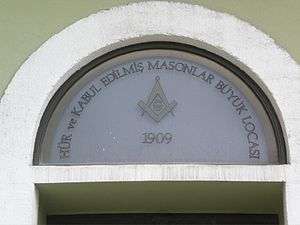Freemasonry in Turkey

The history of Freemasonry in Turkey stretches back to the 18th century under Ottoman imperial rule.
History
18th century
The first lodge in Turkey was probably established around 1721 in Istanbul by Levantines.[1]
19th century
Although Freemasonry in Turkey can be traced into the 18th century, for much of that time it was limited to lodges under the jurisdiction of foreign grand lodges, and there was no independent Turkish Grand Lodge. This changed in 1856, when the first Turkish Grand Lodge was established. Sultan Murad V was a member of the lodge, becoming the first and only Ottoman sultan to join. This first Grand Lodge was banned in 1876 by Murad's successor.
20th century
The Grand Lodge came back in 1909 in Istanbul under a new administration. Because the Grand Lodge was used to operate in secret, it was closed again in 1922, only to be opened in the year 1925 again. In 1935 the Grand Lodge was closed again. As a result of the repeated closures, the former Grand Lodge and its members were reluctant to support Ataturk's reformist policies.
In 1956 the Grand Lodge of Turkey was reestablished in its current form and, together with the light introduction in 1962, recognition was granted by the Grand Lodges of New York and Scotland. In 1970, the Turkish Grand Lodge was recognized by the United Grand Lodge of England and the Grand Lodge of Ireland as a regular lodge.
In 1964, after Süleyman Demirel wrote a public letter declaring that he was not a Freemason in order to win the nomination of the presidency of the Justice Party, a split occurred within the ranks of the Grand Lodge, resulting in the 1966 creation of the Grand Lodge of Liberal Freemasons of Turkey, which is a Continental-oriented body recognized by the Grand Orient de France and declared as irregular by the United Grand Lodge of England.
21st century
A suicide bomb attack on an Istanbul lodge was perpetrated by a Turkish al-Qaeda branch in 2004. Three people were killed in the attack, including the militant Engin Vural.
Anti-Freemasonry
The history of Freemasonry in Turkey has also included the furthering of conspiracy theories by Islamists such as Adnan Oktar[2][3] (who has become a Mason later on) as well as Necmettin Erbakan and his movement Millî Görüş.
Necmettin Erbakan never became a mason.
Masonic Bodies in Turkey
There are several Grand Lodges and Grand Orients currently operating in Turkey.
Grand Lodge of Free and Accepted Masons of Turkey
The Grand Lodge of Turkey (Turkish: Hür ve Kabul Edilmiş Masonlar Büyük Locası) is the largest of several Masonic Grand Lodges overseeing Freemasonry in Turkey. It was founded in 1948 and consists of 180 Lodges in cities around Turkey. As of 2001 it had an estimated 12,000 members.[1] It is recognized by most regular Grand Lodges and follows the traditional Anglo-American style of Freemasonry.
Grand Lodge of Liberal Freemasons of Turkey
The Grand Lodge of Liberal Freemasons of Turkey (Turkish: Özgür Masonlar Büyük Locası) was established in 1966 after a split from the Grand Lodge and follows the Continental Style of Freemasonry.[4]
References
- 1 2 Celil Layiktez. "The History of Freemasonry In Turkey". Pietre-Stones Review of Freemasonry
- ↑ "Muslim creationist Adnan Oktar challenges scientists to prove evolution", Guardian, Monday December 22, 2008.
- ↑ "AN INTERVIEW WITH MR ADNAN OKTAR BY AL JAZEERA TV"
- ↑ webpage of the Grand Lodge of Liberal Freemasons of Turkey
External links
- Webpage of the Grand Lodge of Turkey
- Harunyahya.com, an anti-Masonic website purporting to be a history of Freemasonry and the Knights Templar in Turkey
